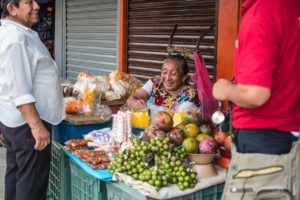The Spanish Imperfect Tense: Describing the Past
In this post we’re going to look at the Spanish imperfect tense. Just like English, there are several past tenses in Spanish that you use, but the two most important ones are the preterit ([yo]hablé, I spoke) and the imperfect ([yo] hablaba, I was speaking). If you think about the difference in English between the simple past I spoke and the past continuous I was speaking, you’ll have a good starting point to understand the difference between the preterit and the imperfect.
Comparing the Preterit and the Imperfect
The preterit is used to describe a completed action in the past. If you say hablé (I spoke), you’re talking about a point in the past. If you think of a timeline, yo hablé happened on one particular point, and then it was over.
The imperfect tense in Spanish is used to describe ongoing, habitual, or incomplete actions in the past. It is often used to set the scene, describe repeated actions, or talk about what someone “used to do.” If you think of that timeline, the imperfect isn’t just one point, it’s something that was happening for a while. Compare these two examples.
- Hablé con mi amigo anoche.
I spoke with my friend last night.
(single point action in the past, completed) - Hablaba con mi amigo cuando recibí tu mensaje.
I was speaking with my friend when I got your message.
(speaking was an ongoing background action, got [preterit] was a one point action)
Forming the Imperfect
There are two different sets of endings for verbs in the imperfect, one for –ar verbs, and another one for –er and –ir verbs.
Imperfect of –ar Verbs
To form the imperfect of -ar verbs, start with the verb’s infinitive stem and add the following endings.
| Subject | Ending | Examples |
| yo | -aba | hablaba (I spoke/was speaking) |
| tú | -abas | hablabas (you spoke) |
| él/ella/usted | -aba | hablaba (he/she/you spoke) |
| nosotros/as | -ábamos | hablábamos (we spoke) |
| vosotros/as | -abais | hablabais (you all spoke) |
| ellos/ellas/ustedes | -aban | hablaban (they/you all spoke) |
Notice from the translations that the imperfect doesn’t always correspond to the English past progressive. Depending on the context, hablaba could be translated as I spoke, I was speaking, I used to speak, or I would speak. Focus instead on the situation that the tense describes: an ongoing or repeated/habitual action or state in the past. Take a look at some examples of regular –ar verbs.
- Yo estudiaba en la biblioteca todos los días.
I used to study in the library every day. - Ellos caminaban por el parque cada tarde.
They would walk in the park every afternoon. - Nosotros jugábamos al fútbol los fines de semana.
We played soccer on weekends. - Tú trabajabas en esa tienda hace años.
You were working in that store years ago. - Ella cantaba canciones hermosas en el coro.
She sang/used to sing beautiful songs in the choir.
Imperfect of –er and –ir Verbs
To form the imperfect of –er or –ir, start with the verb’s infinitive stem and add the following endings.
| Subject | Ending | Examples | Examples |
| yo | -ía | comía (I ate/was eating) | vivía (I lived/was living) |
| tú | -ías | comías (you ate) | vivías (you lived) |
| él/ella/usted | -ía | comía (he/she/you ate) | vivía (he/she/you lived) |
| nosotros/as | -íamos | comíamos (we ate) | vivíamos (we lived) |
| vosotros/as | -íais | comíais (you all ate) | vivíais (you all lived) |
| ellos/ellas/ustedes | -ían | comían (they/you all ate) | vivían (they/you all lived) |
- Yo bebía café todas las mañanas.
I used to drink coffee every morning. - Ellos aprendían español en la escuela.
They were learning Spanish at school. - Nosotros vendíamos frutas en el mercado.
We would sell fruit at the market. - Yo escribía cartas a mi familia cada semana.
I wrote letters to my family every week. - Ellas vivían en un pequeño pueblo.
They were living in a small town. - Nosotros abríamos la tienda temprano cada día.
We used to open the store early every day.
Irregular Verbs in the Imperfect
There are only three irregular verbs in the imperfect: ir (to go), ser (to be) and ver (to see).
| Subject | ir (to go) | ser (to be) | ver (to see) |
| yo | iba | era | veía |
| tú | ibas | eras | veías |
| él/ella/usted | iba | era | veía |
| nosotros/as | íbamos | éramos | veíamos |
| vosotros/as | ibais | erais | veíais |
| ellos/ellas/ustedes | iban | eran | veían |
Major Uses of the Imperfect
Now that we’ve seen how to form the imperfect, let’s look more closely at when to use it. There are certain cases when you should use the imperfect to talk about the past.
Habitual or Repeated Actions in the Past
First, if you’re talking about habitual or repeated actions, use the imperfect. This corresponds to English constructions like used to or would when describing past habits.
- Siempre jugábamos en el parque.
We always used to play in the park. - Veía a mis amigos todos los días hace años.
I would see my friends every day years ago. - Mi familia tenía un perro cuando era niña.
My family had a dog when I was a little girl.
Descriptions in the Past
Second, if you’re giving a description of something in the past, describing a state or condition that wasn’t limited to one particular point in the past, use the imperfect.
- La casa era grande y tenía un jardín.
The house was big and had a garden. - Hacía frío la semana pasada.
It was cold last week. - Los pájaros cantaban y el sol brillaba.
The birds were singing and the sun was shining.
Ongoing Background Activities that were Interrupted in the Past
Another major use of the imperfect is to describe an ongoing ‘background’ state or activity that was interrupted by something else. That interruption is usually in the preterit, because it’s a one-point activity. For the ongoing action, you can use the imperfect of the main verb, or the imperfect of estar with a gerund to stress an ongoing action.
- Yo leía (Estaba leyendo) cuando sonó el teléfono.
I was reading when the phone rang. - Comíamos la cena (Estábamos cenando) cuando alguien llamó a la puerta.
We were eating dinner when someone knocked at the door. - Yo dormía (Estaba durmiendo) cuando llegaste a casa.
I was sleeping when you got home.
Ongoing States
You also use the imperfect when you’re talking about certain states that by their nature are ongoing rather than simple one-point activities, for example age, time, and so on.
- Eran las ocho.
It was 8 o’clock. - Tenía diez años.
I was 10 years old. - Tenía el pelo largo.
She had long hair.
Practice
Now practice the Spanish imperfect tense with several exercises. Transform each of the following present tense sentences into the imperfect. See if you can come up with translations. The answers are below.
- Yo camino al parque.
- Ella come una manzana.
- Nosotros estudiamos para el examen.
- Tú juegas al fútbol.
- Ellos leen muchos libros.
- Vosotros viajáis a España.
- Yo escribo una carta.
- María canta muy bien.
- Nosotros vemos una película.
- Ellas hablan por teléfono.
- Tú corres en el parque.
- Yo hago la tarea.
- Ustedes visitan a sus abuelos.
- Él aprende español.
- Nosotros bebemos café en la mañana.
- Tú cocinas la cena.
- Ellos abren la puerta.
- Yo compro una revista.
- Vosotros trabajáis en una oficina.
- Ella toma el autobús.
- Nosotros escuchamos música.
- Tú pides ayuda.
- Ellas duermen tarde los domingos.
- Yo dibujo un paisaje.
- Tú limpias tu cuarto.
- Nosotros bailamos en la fiesta.
- Él vende frutas en el mercado.
- Ustedes asisten a clase.
- Yo conduzco al trabajo.
- Tú dices la verdad.
- Nosotros volvemos a casa temprano.
- Ellos empiezan la reunión.
- María llega tarde.
- Yo me despierto temprano.
- Vosotros os levantáis a las ocho.
- Tú te duchas por la noche.
- Ellas se divierten en la playa.
- Nosotros nos despedimos de los amigos.
- Él se siente cansado.
- Yo me pongo el abrigo.
Answers
The English translations are possible translations. The exact translation would depend on the exact context that the sentences appear in.
- Yo caminaba al parque. (I used to walk/was walking/would walk to the park.)
- Ella comía una manzana. (She used to eat/was eating an apple.)
- Nosotros estudiábamos para el examen. (We were studying/used to study for the exam.)
- Tú jugabas al fútbol. (You used to play/were playing/would play soccer.)
- Ellos leían muchos libros. (They used to read/were reading many books.)
- Vosotros viajabais a España. (You all used to travel/were traveling to Spain.)
- Yo escribía una carta. (I was writing a letter.)
- María cantaba muy bien. (María used to sing very well.)
- Nosotros veíamos una película. (We were watching a movie.)
- Ellas hablaban por teléfono. (They used to talk/would talk/were talking on the phone.)
- Tú corrías en el parque. (You used to run/were running/would run in the park.)
- Yo hacía la tarea. (I used to do/was doing homework.)
- Ustedes visitaban a sus abuelos. (You all used to visit/were visiting your grandparents.)
- Él aprendía español. (He used to learn/was learning Spanish.)
- Nosotros bebíamos café en la mañana. (We used to drink coffee/would drink in the morning.)
- Tú cocinabas la cena. (You used to cook/were cooking dinner.)
- Ellos abrían la puerta. (They were opening the door.)
- Yo compraba una revista. (I was buying a magazine.)
- Vosotros trabajabais en una oficina. (You all used to work/were working in an office.)
- Ella tomaba el autobús. (She used to take/was taking/would take the bus.)
- Nosotros escuchábamos música. (We used to listen/were listening to music.)
- Tú pedías ayuda. (You used to ask/were asking for help.)
- Ellas dormían tarde los domingos. (They used to sleep/would sleep late on Sundays.)
- Yo dibujaba un paisaje. (I was drawing a landscape.)
- Tú limpiabas tu cuarto. (You used to clean/were cleaning your room.)
- Nosotros bailábamos en la fiesta. (We were dancing at the party.)
- Él vendía frutas en el mercado. (He used to sell fruit/was selling/would sell in the market.)
- Ustedes asistían a clase. (You all used to attend class.)
- Yo conducía al trabajo. (I used to drive/was driving to work.)
- Tú decías la verdad. (You used to tell/would tell the truth.)
- Nosotros volvíamos a casa temprano. (We used to return/would return home early.)
- Ellos empezaban la reunión. (They were starting the meeting.)
- María llegaba tarde. (María used to arrive/would arrive late.)
- Yo me despertaba temprano. (I used to wake up/would wake up early.)
- Vosotros os levantabais a las ocho. (You all used to get up at eight.)
- Tú te duchabas por la noche. (You used to shower at night.)
- Ellas se divertían en la playa. (They used to have fun/were having fun at the beach.)
- Nosotros nos despedíamos de los amigos. (We were saying goodbye to the friends.)
- Él se sentía cansado. (He used to feel/was feeling tired.)
- Yo me ponía el abrigo. (I was putting on the coat.)
Get on the road to speaking Spanish with the Language Garage!
We hope you’ve enjoyed learning about the Spanish imperfect tense. If you’re interested in learning more, check out our other posts on Spanish language, culture, and more. If you’re looking for convenient and affordable live Spanish lessons with a real teacher, visit The Language Garage. Our lessons are affordable and fun, and they’re given online in a virtual classroom, so it doesn’t matter where you live or work – we can come to you. We have flexible options, with a free trial so that you can decide if there’s a fit. Check us out!
Image by Soledadsnp from Pixabay






